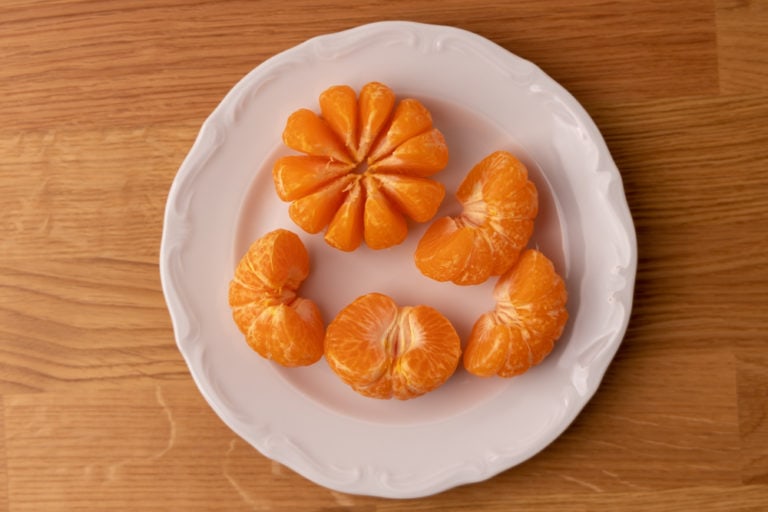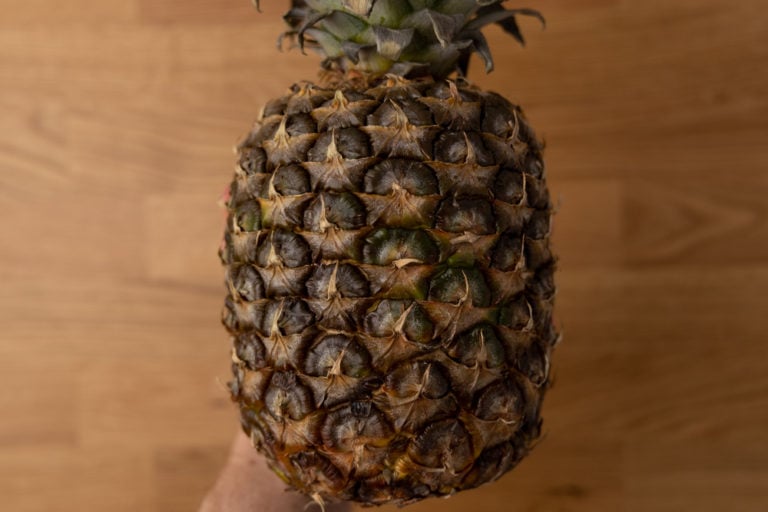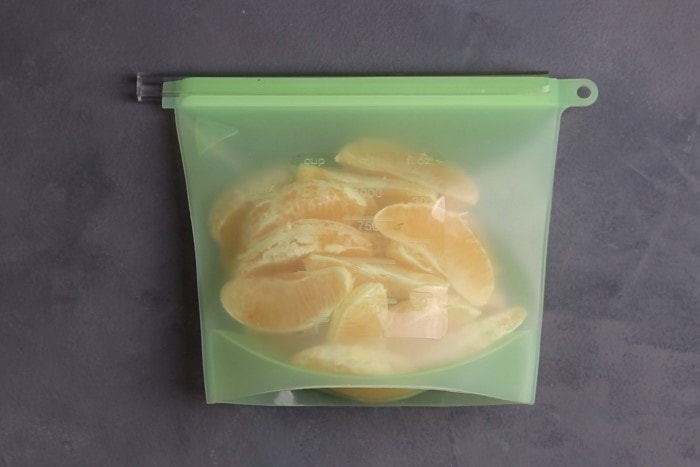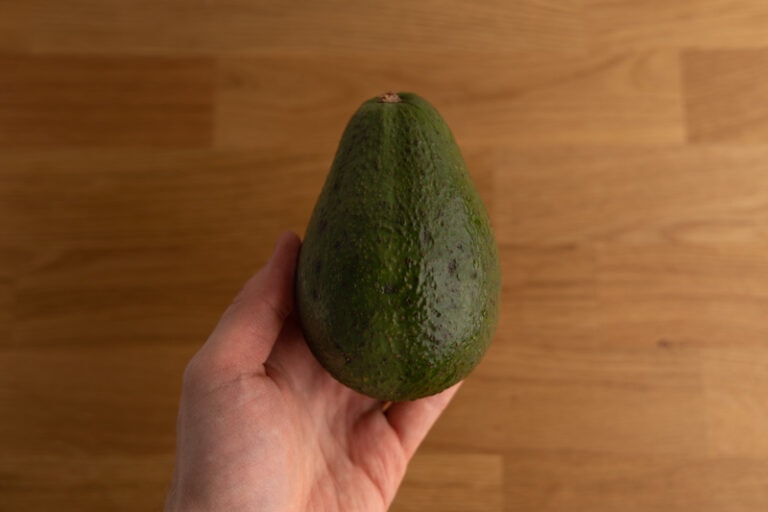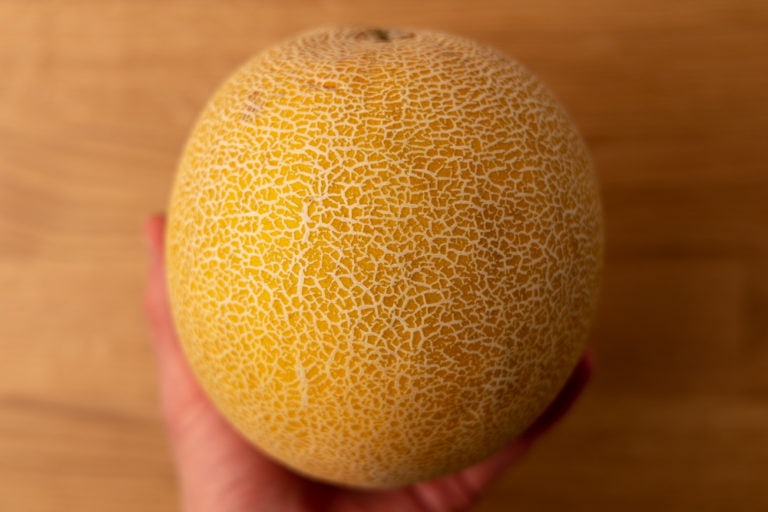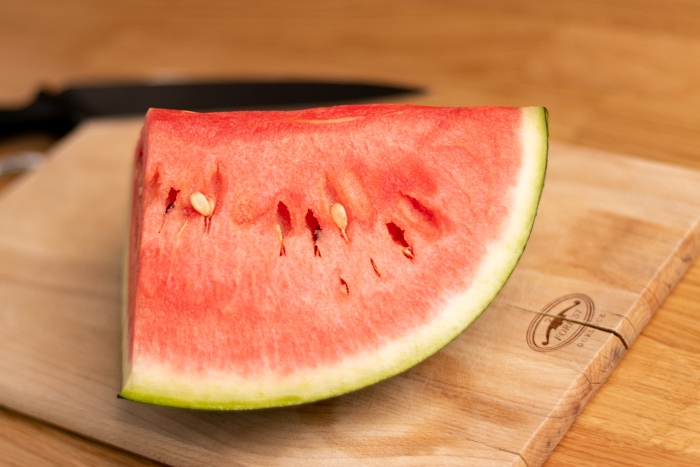How Long Do Peaches Last and How to Tell if They’re Bad?
Here’s everything you need to know about the shelf life and storage of peaches. Learn how long peaches last, how to tell if one is ripe, and how to tell when a peach is spoiled.
Bought a bag of peaches and wondering how long peaches are good for?
Or maybe yours sit in the fridge for a couple of days already, and before eating, you need to know what spoilage signs you should look for.
Sounds familiar? If so, this article is for you.
But before we can get to shelf life and spoilage, you first need to know how to tell if a peach is ripe. So let’s start with that.
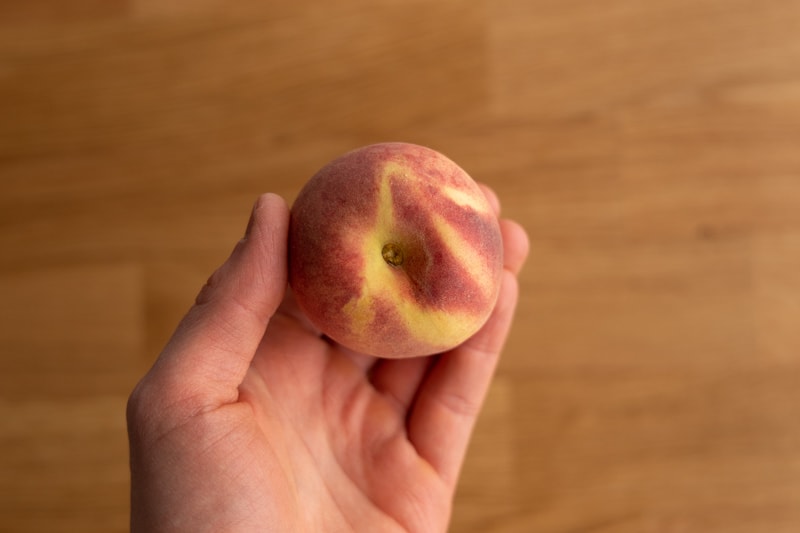
When Are Peaches Ripe?
A ripe peach gives slightly under gentle pressure – it’s not completely firm, but it’s not so soft that you’ll leave a bruise if you’re not super gentle.
Firm peaches are unripe, and you still need some time until they’re soft and juicy, while soft peaches are overripe, and it’s best to use them as soon as possible.
Firmness is the best way to check if a peach is ripe or not. You can also look for a sweet aroma and golden yellow color (instead of light yellow) near the stem, but these aren’t as consistent. Plus, it’s not always clear if the fragrance is strong or sweet enough, or if that tint near the stem is still light yellow or not.
(Check out the storage section for details on how to ripen peaches.)
Knowing that, let’s talk about the shelf life.

How Long Do Peaches Last?
| Counter | Fridge | |
|---|---|---|
| Peaches, unripe | 1 – 3 days, until ripe | |
| Peaches, ripe | 1 – 2 days | 5 – 7 days |
| Peaches, cut | up to 4 days |
Unripe peaches need 1 to 3 days to ripen. Once ripe, they keep for up to a week if you refrigerate them and only 1 to 2 days if you leave them at room temperature.
If you need more time, you can always freeze peaches or make peach jam.
The exact time a peach retains quality depends on how ripe it is.
A peach that’s just ripe or that you ripened yourself should last for 5 to 7 days without softening too much. But if you’ve bought it quite soft or left it at room temperature after ripening, you’ll have only a couple of days.
Knowing that allows you to easily pick peaches in the grocery store based on what you need at the time:
- Buy firm ones if you don’t mind waiting for at least a day or two until they ripen and are at peak quality.
- Choose ones that yield under gentle pressure if you need some for the next few days.
- Grab soft peaches on a sale if you know you’ll eat them within a day or so, or you plan on cooking or baking with fresh peaches in the evening.
Next, let’s talk about spoilage signs.
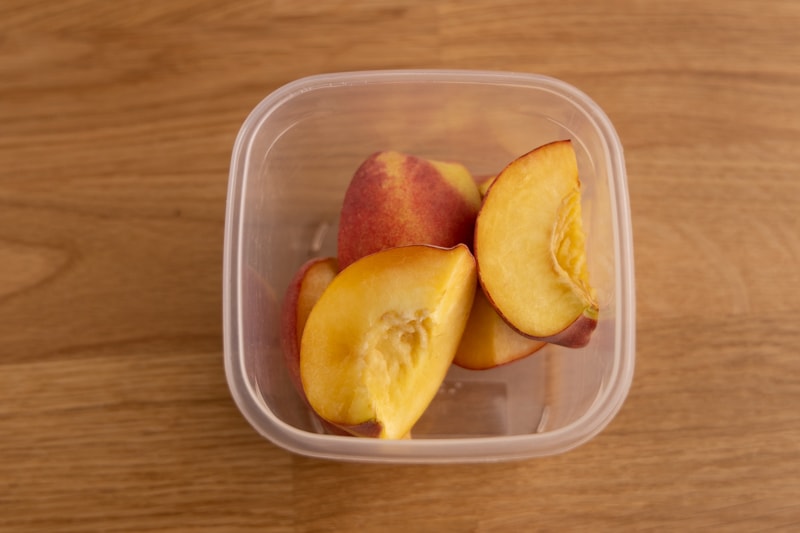
How to Tell if a Peach Is Bad?
Discard peaches that:
- Are moldy or rotten. Wounded peaches grow mold, and ones that sit at room temperature for too long often rot. If the affected area is tiny, you can probably cut it off, but if it’s not, discard the whole fruit.
- Are mushy, squishy, or seeping. If the fruit gets to the point that just grabbing it leaves an indentation or is super soft in a gross kind of way, it’s done for.
- Smell musty. If the whole bunch gives off a musty or “funny” smell, and it’s not apparent which one is bad, err on the side of caution and toss all of them.
- Are brown inside. Stone fruits are known to suffer from internal breakdown that doesn’t (at first) leave any signs on the skin. So if you open the peach and most of the flesh is brown or translucent, toss it. You can probably cut out some minor changes and eat the rest if you like.
If you notice anything else about the peaches that seems off, trust that impulse and get rid of them. Better safe than sorry.
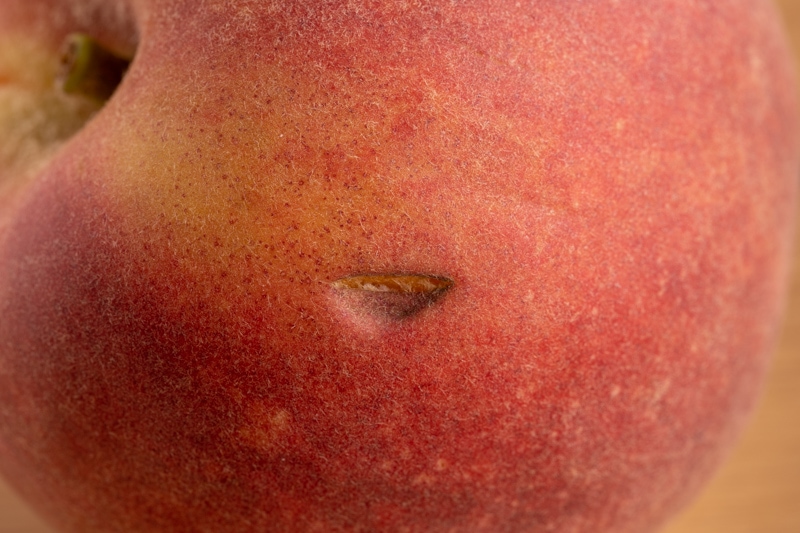
Now, it’s not always clear if a super soft peach is still good enough to eat or not. It’s your decision to make.
For me, I always grab them with my hand and give them a super gentle squeeze. If it yields so much that I find it gross, it ends up in the trash. But if it’s soft but doesn’t repulse me, I use it.
What if the peach is too soft for a fruit salad or to eat as a snack, but you don’t think it’s bad enough to toss it?
Use it in a cooked recipe.
I already mentioned peach jam, and there are hundreds of other recipes in which you can use peaches, especially if you’re into baked goods. Just google whatever you’d like to make and add the word “peach” at the end of the query, and you’ll find dozens of recipes to choose from.
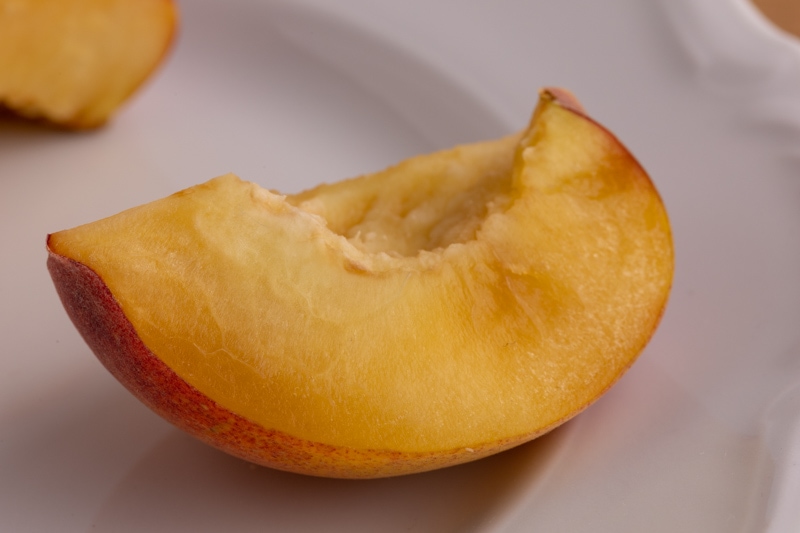
How to Store Peaches?
Store unripe peaches at room temperature on the counter until they ripen. Once ripe, you can leave them on that same counter for 1 to 2 days or refrigerate them in a plastic bag or crisper drawer for up to a week.
Here are some things to keep in mind:
- Wash before eating and don’t use detergents. Running water is good enough. And if you need to wash your peaches before storage, dry them thoroughly.
- Refrigerate only after ripe. If you don’t let your peaches ripen, they won’t be nearly as juicy and sweet as they’re supposed to be. Instead, they’ll be sour and crunchy.
- Don’t stack. Ripe peaches bruise easily, so stacking them in storage is never a good idea. That’s also why we’re gentle when checking if they’re ripe – nobody likes a bruised peach that spoils quickly.
- Leave at room temperature for about an hour before consumption for the best flavor.
The same ideas apply when storing nectarines and storing apricots.
Now, let’s cover ripening under-ripe peaches.
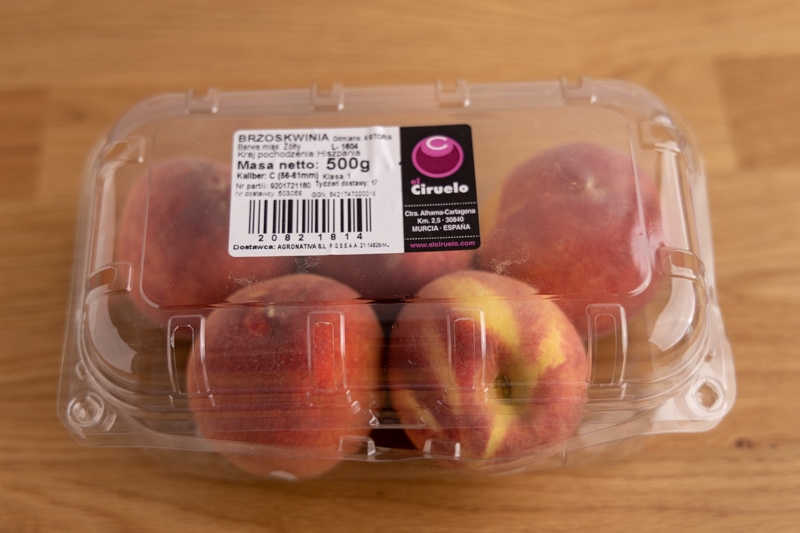
How to Ripen Peaches?
Peaches ripen on the counter at room temperature. Put them in a place away from sunlight, arrange them in a single layer, not touching each other, and ensure they are well ventilated.
To speed up the process, you can ripen peaches in a folded brown bag that traps the ethylene gas responsible for ripening, but still allows the fruits to breathe.
For even faster ripening, you can place another ethylene-producing fruit or veggie inside that bag, like an apple or a banana.
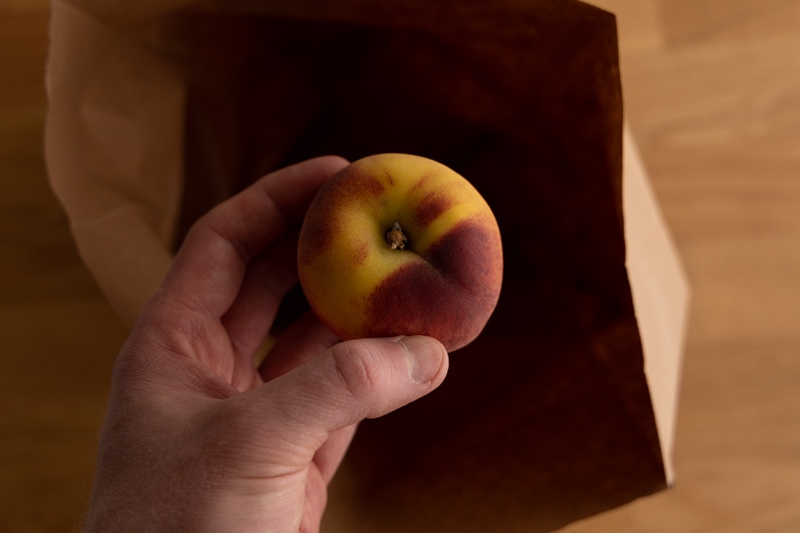
Peaches are climacteric, which means they can continue ripening off the tree. So as long as the fruit wasn’t picked green and super firm, it should ripen just fine given enough time.
Typically, peaches take 1 to 3 days to ripen, but if yours are still firm after three days, give them another day or two. And make sure the whole fruit is slightly soft – a single tender spot isn’t enough.
Ripening peaches is mostly about ethylene gas. The more of the gas (which is also a hormone) around, roughly speaking, the sooner the peaches will be ripe.
Knowing that, the methods of accelerating the process I suggested above make perfect sense.
Placing the fruits in a brown bag helps trap the ethylene that peaches produce. And throwing in another ethylene-producing fruit or veggie helps increase the concentration of the gas even more.
One thing you want to avoid is using plastic bags for ripening. The issue with those is that besides trapping the ethylene, they also trap all the moisture. And as you know, excess moisture at room temperature often means premature spoilage.
Brown bags allow peaches to breathe and moisture to evaporate.
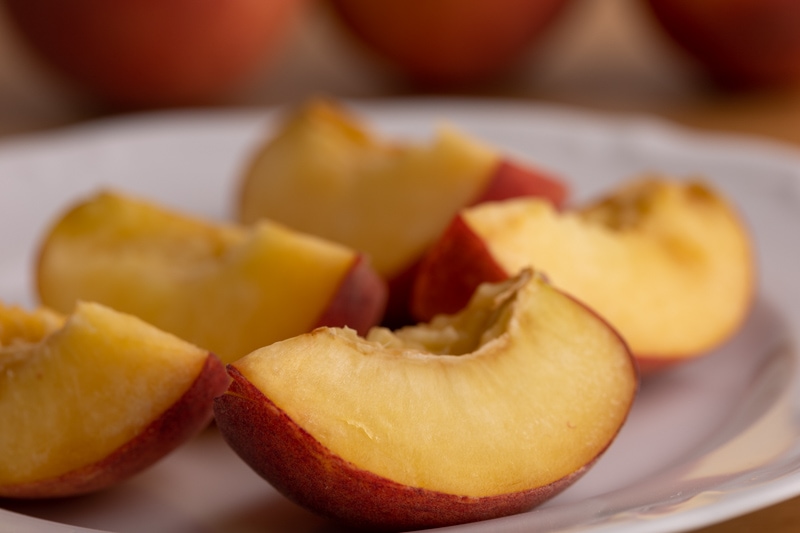
Do Peaches Need to Be Refrigerated?
Ripe peaches don’t require refrigeration, but doing so is highly recommended because it prolongs their storage time by a couple of days. Ripe peaches will keep for only 1 to 2 days if you leave them on the counter but will last up to a week if refrigerated.
You shouldn’t refrigerate unripe peaches – leave them at room temperature until they ripen properly.
In other words, it’s all about whether they’re ripe and how long you need to store them.
If you’re going to eat them the very same day (or the day after), they can sit at room temperature. Just make sure they’re in a cool, dry, and dark place, and are well ventilated.
(And that they sit away from ripening fruits and veggies that produce ethylene, of course.)
To refrigerate peaches, seal them in a plastic bag and put them on a fridge shelf, or place them in the crisper drawer. For the latter, you can skip the bag.
Both options work well because they help peaches retain their moisture so that they won’t soften prematurely.
Peaches Shelf Life and Spoilage Summary
Thank you for reading this short guide on peaches. Let’s briefly recap the main points we’ve covered above:
- When is a peach ripe? Ripe peaches yield slightly under gentle pressure. If they’re firm and don’t give at all, they’re underripe and need more time. And if they’re soft and bruise easily, they’re overripe and won’t last long.
- How long do peaches last? Unripe peaches need 1 to 3 days to ripen. Once ripe, they keep for 1 to 2 days at room temperature or up to a week in the refrigerator.
- How to tell if a peach is bad? Throw out peaches that are moldy, rotten, mushy, seeping water, or brown inside. If the bunch smells “funny,” but you can’t pinpoint why, they should go as well.
Rotten Records: Share Your Snap!
Caught some food past its prime? Upload your photo to “Rotten Records” and help others spot the signs of spoilage. Every image makes our food community safer and more informed!
